Related Research Articles
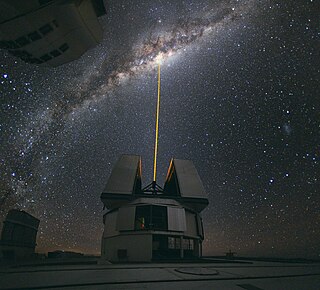
Astronomy is a natural science that studies celestial objects and the phenomena that occur in the cosmos. It uses mathematics,physics,and chemistry in order to explain their origin and their overall evolution. Objects of interest include planets,moons,stars,nebulae,galaxies,meteoroids,asteroids,and comets. Relevant phenomena include supernova explosions,gamma ray bursts,quasars,blazars,pulsars,and cosmic microwave background radiation. More generally,astronomy studies everything that originates beyond Earth's atmosphere. Cosmology is a branch of astronomy that studies the universe as a whole.

Nsukka is a town and a Local Government Area in Enugu State,Nigeria. Nsukka shares a common border as a town with Edem,Opi,Ede-Oballa,and Obimo.

The University of Nigeria,commonly referred to as UNN,is a federal and public research university located in Nsukka,Enugu State,Eastern part of Nigeria. Founded in 1955 by Nnamdi Azikiwe who was the Governor General of Nigeria between 1960 and 1963,and first President of Nigeria between 1963 and 1966. The University of Nigeria Nsukka was formally opened on 7 October 1960,as one of the first generation universities in Nigeria and is ranked among the top universities in Nigeria and Africa. The University of Nigeria has three campuses in Enugu State–Nsukka,Enugu,and Ituku-Ozalla –and the Aba campus in Abia State.
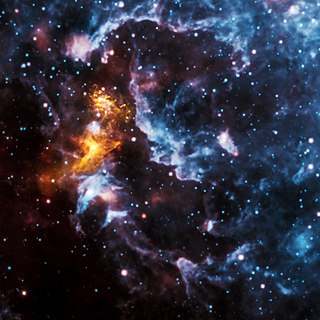
A pulsar is a highly magnetized rotating neutron star that emits beams of electromagnetic radiation out of its magnetic poles. This radiation can be observed only when a beam of emission is pointing toward Earth,and is responsible for the pulsed appearance of emission. Neutron stars are very dense and have short,regular rotational periods. This produces a very precise interval between pulses that ranges from milliseconds to seconds for an individual pulsar. Pulsars are one of the candidates for the source of ultra-high-energy cosmic rays

Thebe Rodney Medupe is a South African astrophysicist and founding director of Astronomy Africa. He is perhaps best known for his work on the Cosmic Africa project that attempts to reconcile science and myth.

Peter Goldreich is an American astrophysicist whose research focuses on celestial mechanics,planetary rings,helioseismology and neutron stars. He is the Lee DuBridge Professor of Astrophysics and Planetary Physics at California Institute of Technology. Since 2005 he has also been a professor at the Institute for Advanced Study in Princeton,New Jersey. Asteroid 3805 Goldreich is named after him.
In astronomy,a glitch is a sudden small increase of around 1 part in 1 million in the rotational frequency of a pulsar,which usually decreases steadily due to braking provided by the emission of radiation and high-energy particles. It is not known whether glitches are related to the timing noise which all pulsars exhibit. Following a glitch is a period of gradual recovery where the observed periodicity slows to a period close to that observed before the glitch. These gradual recovery periods have been observed to last from days to years. As of 2024 only multiple glitches of the Crab and Vela pulsars have been observed and studied extensively.
The Ebira people are an ethnic-linguistic group of North central Nigeria. Most Ebira people are from Kogi State and Nasarawa State. Their language is usually classified as Nupoid and within the Benue-Congo branch of the Niger-Congo language family. Until the separation of Kogi State from Kwara State,Okene,located not far from the Niger-Benue confluence,was seen as the administrative center of the Ebira-speaking people in Kogi state. Since the formation of the state,the Ebira Ta'o people are predominantly found in five local governments in Kogi state,namely Adavi,Ajaokuta,Okehi,Okene and Ogori/Magongo. They are also found in large numbers in the Federal Capital Territory,Abuja and Nasarawa in Toto LGA. Also,the Eganyi are found in Ajaokuta LGA. And the Etuno can be found in Igarra town of Ogorimagongo,Okehi and Okene each with their administrative headquarters. Ebira Koto is found in Kogi and Koton Karfe LGA,Bassa LGA,Lokoja in Kogi and Abaji LGA in the Federal Capital Territory,Akoko-Edo LGA,Edo State.
Aliu Babatunde Fafunwa. He was the first Nigerian Professor of Education. He was a Nigerian Educationist,Scholar and Former Minister for Education. As Minister,he was in charge of the biggest school system in Africa. He is known for his early writings on the need to re-appraise the inherited colonial epistemological system in Nigeria and to introduce relevant cultural goals,subjects and local languages into the system,in order to accommodate the developmental and cultural pattern of the country. He is also a notable authority on the History of Educational Planning in Nigeria.
Cultural astronomy,sometimes called the study of Astronomy in Culture,has been described as investigating "the diversity of ways in which cultures,both ancient and modern,perceive celestial objects and integrate them into their view of the world." As such,it encompassed the interdisciplinary fields studying the astronomies of current or ancient societies and cultures. It developed from the two interdisciplinary fields of archaeoastronomy,the study of the use of astronomy and its role in ancient cultures and civilizations,and ethnoastronomy,"a closely allied research field which merges astronomy,textual scholarship,ethnology,and the interpretation of ancient iconography for the purpose of reconstructing lifeways,astronomical techniques,and rituals." It is also related to historical astronomy,history of astronomy and history of astrology.
The Sophia Centre was founded in the School of Historical and Cultural Studies at Bath Spa University in 2002,as the first University centre in the world to teach cultural astronomy and the history and culture of astrology.
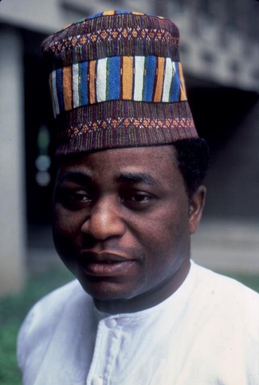
Samuel Ejikeme Okoye was a Nigerian astrophysicist from Amawbia in Anambra State,Nigeria. Okoye was the first Black African to obtain a doctorate degree in radio astronomy.
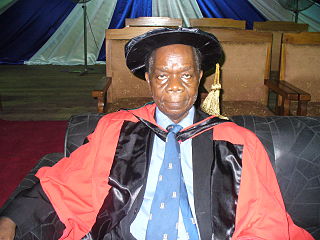
Alexander Obiefoka Enukora Animalu is a Nigerian academic,who is Professor Emeritus of Physics at the University of Nigeria,Nsukka.

Jephthah Elochukwu Unaegbu is a Nigerian writer,researcher,freelance journalist,actor,and documentary film maker.

The Great Mosque of Mahdiya is a mosque that was built in the tenth century in Mahdia,Tunisia. Located on the southern side of the peninsula on which the old city was located,construction of the mosque was initiated in 916,when the city was founded by the Fatimid caliph Abdallah al-Mahdi,to serve as the new city's main mosque. Most of the Fatimid-era city and its structures have since disappeared. The current mosque was largely reconstructed by archeologists in the 1960s,with the exception of its preserved entrance façade.
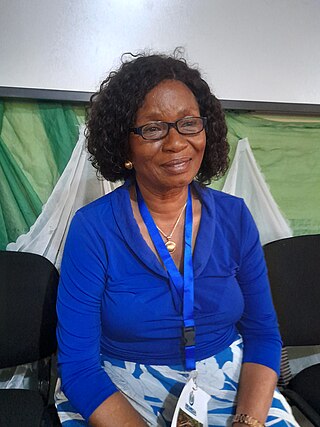
Francisca Nneka Okeke is a Nigerian physicist. She is a Professor of Physics at the University of Nigeria,Nsukka and first female head of a department in the University.
Jarita Charmian Holbrook is an American astronomer and associate professor of physics at the University of the Western Cape (UWC) where she is principal investigator of the Astronomy &Society group. Holbrook's work examines the relationship between humans and the night sky,and she has produced scientific publications on cultural astronomy,starburst galaxies,and star formation regions.

John Seiradakis was a Greek astronomer and professor emeritus at the Department of Physics of the Aristotle University of Thessaloniki. He is best known for his contributions in the understanding of radio pulsars,the Galactic Center and archaeoastronomy. Since the early 2000s he was heavily involved in the decoding of the Antikythera mechanism. He was a founding member of the Hellenic Astronomical Society,the European Astronomical Society and the International Olympiad on Astronomy and Astrophysics (IOAA).

Pius Nwankwo Okeke is a Nigerian astronomer and educator who contributed immensely to African space research. He is known as the Father of Astronomy in Nigeria.
Kenneth Brecher is an American professor of astronomy and physics,emeritus at Boston University,with a focus on high-energy astrophysics,relativity,and cosmology. His wife,Aviva Brecher,is also a physicist.
References
- 1 2 3 "Professor Urama's Profile". staffprofile.unn.edu.ng. Retrieved 2024-06-18.
- 1 2 3 4 5 6 7 8 9 10 "Urama CV" (PDF). University of Nigeria.
- ↑ National Universities Commission (2021). "Directory of Full Professors in the Nigerian University System" (PDF). p. 746.
- ↑ Audu, Umar (2023-11-12). "INEC declares APC's Ododo as winner of Kogi governorship election". Daily Nigerian . Retrieved 2024-06-18.
- ↑ Sanni, Kunle (2023-11-12). "Kogi Guber Poll: PDP, SDP agents protest alleged irregularities". Peoples Gazette Nigeria. Retrieved 2024-06-18.
- ↑ "Professor Johnson Urama – Independent Newspaper Nigeria" . Retrieved 2024-06-18.
- ↑ "JO Urama - AD Scientific Index 2024". www.adscientificindex.com. Retrieved 2024-07-22.
- ↑ "Physics and Astronomy Department - Contact". Faculty of Physical Sciences, University Of Nigeria Nsukka. Retrieved 2024-06-18.
- ↑ Akamigbo, Uju (November 2019). "Pharmacy Alumni Gove Back to Their Alma Mater" (PDF). University of Nigeria Information Bulletin.
- ↑ "UNN VC Pledges Sustainability of ACE-SPED Project as Team of Evaluators Visits". ACESPED. January 21, 2024.
- ↑ "Ododo Wins In Kogi, Diri Coasts To Victory In Bayelsa – Independent Newspaper Nigeria". 2023-11-13. Retrieved 2024-06-18.
- ↑ Ugwu, Francis (2023-11-12). "Kogi Guber: 'Don't push me to use my powers' - Returning Officer warns SDP secretary". Daily Post Nigeria. Retrieved 2024-06-18.
- ↑ Ikem, Felix (June 8, 2024). "Professor Ezeokonkwo emerges acting VC of UNN". The Sun (Nigeria) .
- ↑ Report, Agency (2024-06-07). "UNN elects acting vice-chancellor". Premium Times Nigeria. Retrieved 2024-06-18.
- 1 2 Urama, Johnson; Jarita C., Holbrook (2011). "The African Cultural Astronomy Project" (PDF). Cambridge University Press.
- ↑ "The moon's path is full of thorns: Fellows Friday with Johnson Urama | TED Blog". 2013-11-01. Retrieved 2024-06-18.
- 1 2 3 4 African Cultural Astronomy. doi:10.1007/978-1-4020-6639-9.
- 1 2 African Cultural Astronomy. Astrophysics and Space Science Proceedings. 2008. doi:10.1007/978-1-4020-6639-9. ISBN 978-1-4020-6638-2.
- ↑ Institution, Smithsonian. "African cultural astronomy: current archaeoastronomy and ethnoastronomy research in Africa / Jarita C. Holbrook, R. Thebe Medupe, Johnson O. Urama editors". Smithsonian Institution. Retrieved 2024-06-18.
- ↑ "volume | PIER Journals". www.jpier.org. Retrieved 2024-06-18.
- ↑ Shabanova, T. V.; Lyne, A. G.; Urama, J. O. (May 2001). "Evidence for Free Precession in the Pulsar B1642–03". The Astrophysical Journal. 552 (1): 321. arXiv: astro-ph/0101282 . Bibcode:2001ApJ...552..321S. doi:10.1086/320438.
- ↑ Liu, Z. Y; Wang, N; Urama, J. O; Manchester, R. N (October 2006). "Monitoring of Pulse Intensity and Mode Changing for PSR B0329+54". Chinese Journal of Astronomy and Astrophysics. 6 (S2): 64–67. doi:10.1088/1009-9271/6/s2/14. ISSN 1009-9271.
- ↑ Urama, J. O. (2001). "The Challenges of Astronomy in Nigeria". Physica Scripta. T97 (1): 20. Bibcode:2001PhST...97...20U. doi:10.1238/physica.topical.097a00020. ISSN 0031-8949.
- ↑ Eya, Innocent Okwudili; Urama, Johnson Ozoemene; Chukwude, Augustine Ejikeme (2019-06-01). "On the distributions of pulsar glitch sizes and the inter-glitch time intervals". Research in Astronomy and Astrophysics. 19 (6): 089. arXiv: 1812.10053 . doi:10.1088/1674-4527/19/6/89. ISSN 1674-4527.
- ↑ "Johnson O. Urama". scholar.google.com. Retrieved 2024-06-18.